If one of your resolutions for the new year is to improve your conversational skills — and no offense, but maybe it should be — then I have the book for you. Friend of (and contributor to) this site Daniel Menaker has a book out next week called A Good Talk: The Story and Skill of Conversation. In it, he writes in his trademark funny and erudite way about the history of conversation and the ways in which we might improve our talking game. Menaker recently sat down with a very special guest to discuss the project:
Archives, December, 2009
Thursday, December 31st, 2009
Menaker Discusses Menaker With Menaker
Thursday, December 31st, 2009
He’ll Smile If He Wants To. Back Off.
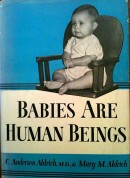 I’m celebrating the end of the decade on Martha’s Vineyard with some friends. The other day, we went to a library here that’s having a book sale. Well, sale is the wrong word, because these books are free.
I’m celebrating the end of the decade on Martha’s Vineyard with some friends. The other day, we went to a library here that’s having a book sale. Well, sale is the wrong word, because these books are free.
We found the lovely volume pictured at left, Babies Are Human Beings. You might think this is common knowledge, given how human babies seem, but apparently this was groundbreaking in 1938 when the book was first published.
Of course, the book’s argument is more subtle than its title suggests. According to the flap copy, “Here, for the first time, parents have been taught to face the facts: babies are not carbon copies of their parents. Each child has a personality of his own from the first day of his life.”
Mostly, we liked the cover. And the great caption for the cover’s photo, which is reprinted facing page 80. That caption: “Strangers may make grotesque faces at him in well-meant attempts to elicit his smile . . .”
Tuesday, December 29th, 2009
In the Ether
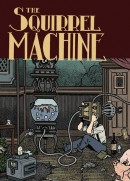 Robert Birnbaum didn’t let his bafflement keep him from enjoying cartoonist Hans Rickheit’s The Squirrel Machine. (“Let me know if you figure out what it’s about, though not knowing made it no less fun for me.”) . . . Norm Geras has posted a Boxing Day literary quiz on his web site. Twenty-five clues lead you to 50 writers. Send in your answers for a possible prize. From a quick look, I think it’s fairly tough — best of luck. . . . John Self discusses his year in reading, including a book that “at first seems ridiculous and laughable – and then seems ridiculous and laughable, but also clever and mesmerizing.” . . . Another book-related goal of mine in 2010 is to begin reading Robert Walser. . . . Maud Newton solicits support for what sounds like a very worthy cause, Girls Write Now, “a nonprofit organization that pairs at-risk teen girls with professional writers who support them. The pairs meet regularly, alone and in groups, and the girls who finish the program all go on to college.”
Robert Birnbaum didn’t let his bafflement keep him from enjoying cartoonist Hans Rickheit’s The Squirrel Machine. (“Let me know if you figure out what it’s about, though not knowing made it no less fun for me.”) . . . Norm Geras has posted a Boxing Day literary quiz on his web site. Twenty-five clues lead you to 50 writers. Send in your answers for a possible prize. From a quick look, I think it’s fairly tough — best of luck. . . . John Self discusses his year in reading, including a book that “at first seems ridiculous and laughable – and then seems ridiculous and laughable, but also clever and mesmerizing.” . . . Another book-related goal of mine in 2010 is to begin reading Robert Walser. . . . Maud Newton solicits support for what sounds like a very worthy cause, Girls Write Now, “a nonprofit organization that pairs at-risk teen girls with professional writers who support them. The pairs meet regularly, alone and in groups, and the girls who finish the program all go on to college.”
Tuesday, December 29th, 2009
How You Can Bowl Better Using Self-Hypnosis and Other (Very) Weird Books
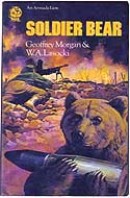 AbeBooks has put together a “Weird Book Room” on its site, and the result is some head-spinning fun. For instance: 50 Ways to Use Feminine Hygiene Products in a Manly Manner, with a photo on the cover of a man bird hunting, about to shoot. Oooookay.
AbeBooks has put together a “Weird Book Room” on its site, and the result is some head-spinning fun. For instance: 50 Ways to Use Feminine Hygiene Products in a Manly Manner, with a photo on the cover of a man bird hunting, about to shoot. Oooookay.
The most fertile category for out-and-out craziness is the crafts and games books, which includes: The Lost Art of Towel Origami (lost for a reason, one assumes), the Gangsta Rap Coloring Book, and the honeymoon favorite Erotic Dots: Join the Dots to Create 60 Sexy and Exciting Pictures.
A best cover is almost impossible to choose (the one for Why do I Vomit? is pretty great), but I might go with the image for Soldier Bear, the “true story of the Syrian brown bear who was the mascot of the 22nd Transport Company of the Polish Army, during the Second World War.”
Visit the Weird Book Room now, and frequently. (I’ve seen this in several places now, and I don’t remember who to credit for the initial find. So, thanks to the bookish Internet in general.)
Monday, December 28th, 2009
Programming Note and Spambot Query
I’m heading out of town for the week starting Monday morning. There will be some posts on the blog and a couple of updates to the Shelf in the next few days. But like the rest of the world, I won’t be back to full speed until next week. I hope you’ve all been enjoying the holidays.
Meanwhile, a spambot who recently dropped by the site wants to know: “How much money does Wisconsin make a year from speeding tickets, and where does that money go?” Something to ponder. (I’m thinking of sharing some of the best spambot material from time to time. The comments that aren’t in Russian are sometimes entertaining. Heck, the ones in Russian might be the most entertaining, but I wouldn’t know.)
Tuesday, December 22nd, 2009
Reading Resolutions
Near the end of each year, I like to think of what books that have been on my shelves for a while I’ll get around to reading in the next 12 months. Below are five that I hope to get through. If you have any reading projects for the new year, please feel free to share.
Earthly Powers by Anthony Burgess
The Bell by Iris Murdoch
The James Family by F. O. Matthiessen
A Hazard of New Fortunes by William Dean Howells
The Long Goodbye by Raymond Chandler
Monday, December 21st, 2009
“What feels so right can’t be wrong.”
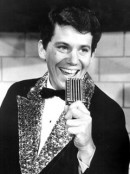 I recently suggested that Todd Bridges’ forthcoming memoir, Killing Willis, is an early contender for Best Book Title of 2010. Well, you can add another finalist to the list. Another collection of personal ads from the London Review of Books is being published in February, and the title is Sexually, I’m More of a Switzerland
I recently suggested that Todd Bridges’ forthcoming memoir, Killing Willis, is an early contender for Best Book Title of 2010. Well, you can add another finalist to the list. Another collection of personal ads from the London Review of Books is being published in February, and the title is Sexually, I’m More of a Switzerland.
Meanwhile, there’s now a Twitter feed of LRB personals. Here are a few of the best from recent days:
I bet a friend £18 I’d find a woman here and have sex with her. Reply and have sex with me, I’ll cut you in at 37%. English Professor, 63.
I’m placing an ad in this column. Things are worse than I thought. Not as bad as they are for you, F, reading this and about to reply. M, 34.
The celebrity I resemble the most is Potsie from Happy Days. What feels so right can’t be wrong. Man, 46. Box no. 2480.
F,45. Ready to begin again with M willing to provide time-sheets/supporting documentary evidence for every minute spent out of the house.
There’s enough lithium in my medicine cabinet to power three electric cars across a sizeable desert. Man, 33. Officially Three Cars Crazy.
Many people carry scars from past relationships. Not me: mine come from Chinese buffets. Clumsy, argumentative dim sum enthusiast (M, 45).
There are 289 species of octopus. I can, and will, name them all during the act of love. M, 58. Box no. 6759.
I grazed my knee writing this advert. Accident prone F, 35. Box no. 4311.
Monday, December 21st, 2009
My Year in Reading
The Millions kindly asked me to participate in its Year in Reading series, which asks people to name the books they enjoyed most in 2009, regardless of publication date. My answers can be found here.
Friday, December 18th, 2009
The Beat
A weekly roundup of noteworthy reviews from other sources.
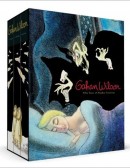 Thomas DePietro reviews a new, beautifully designed three-volume collection of Gahan Wilson’s cartoons for Playboy. (“Wilson, in short, is very much a creature of his time, the postwar era of domestic prosperity and nuclear anxiety. Without ever losing sight of the humor in it all, Wilson reveals in these many cartoons a disgust with the American war machine, rage over possible Armageddon, and fear of ecological catastrophe.”) . . . A review of several creepy books, including two that “offer an intriguing overview of how the supernatural short story has developed in the U.S. over the past 200 years.” . . . Philip Hoare reviews The Bedside Book of Beasts by Graeme Gibson, a lavishly illustrated look at predators and their prey. . . . In 1993, a freight ship called the Golden Venture got stuck approaching New York, with nearly 300 undocumented Chinese on board. In The Snakehead, Patrick Radden Keefe explores the underground economy and intrigue in Chinatown and around the world. Ted Conover says that “Keefe has done an immense amount of research around the globe; if the Golden Venture beaching was the tip of an iceberg, then here, finally, is the iceberg.” . . . The Economist calls Nicholas Wade’s The Faith Instinct “a masterly book. It lays the basis for a rich dialogue between biology, social science and religious history.”
Thomas DePietro reviews a new, beautifully designed three-volume collection of Gahan Wilson’s cartoons for Playboy. (“Wilson, in short, is very much a creature of his time, the postwar era of domestic prosperity and nuclear anxiety. Without ever losing sight of the humor in it all, Wilson reveals in these many cartoons a disgust with the American war machine, rage over possible Armageddon, and fear of ecological catastrophe.”) . . . A review of several creepy books, including two that “offer an intriguing overview of how the supernatural short story has developed in the U.S. over the past 200 years.” . . . Philip Hoare reviews The Bedside Book of Beasts by Graeme Gibson, a lavishly illustrated look at predators and their prey. . . . In 1993, a freight ship called the Golden Venture got stuck approaching New York, with nearly 300 undocumented Chinese on board. In The Snakehead, Patrick Radden Keefe explores the underground economy and intrigue in Chinatown and around the world. Ted Conover says that “Keefe has done an immense amount of research around the globe; if the Golden Venture beaching was the tip of an iceberg, then here, finally, is the iceberg.” . . . The Economist calls Nicholas Wade’s The Faith Instinct “a masterly book. It lays the basis for a rich dialogue between biology, social science and religious history.”
Friday, December 18th, 2009
Icebreaker
The opening sentence of The Man Who Watched Trains Go By by Georges Simenon:
As far as Kees Popinga was personally concerned, it should be admitted that at eight in the evening there was still time: his fate, among others, had yet to be sealed.
Friday, December 18th, 2009
What Happens When You Say “Lolita”?
OK, this is strange. Bear with me.
Inspired by Natalia Antonova’s recent essay about Lolita, I finally read the novel. (I know.) Its language is stunning, even if its plot is not, and I was surprised, among other things, by how funny it is. It reminded me, in a few ways, of another favorite book of mine, Money by Martin Amis. (I realize that if I had read them in the order I should have, I would say that Money reminded me of Lolita, not the other way around.)
Anyway, to continue this circuitous path to a point (of sorts), Maud Newton recently asked readers what lines might best represent their favorite novels. And the first response from a reader was this line from Lolita:
Lo-lee-ta: the tip of the tongue taking a trip of three steps down the palate to tap, at three, on the teeth. Lo. Lee. Ta.
When I was reading the novel, this line tripped me up. It appears in the very first paragraph. (Not a good time to be tripped up.) Naturally, it spurred me to say “Lolita” to myself and feel this “trip of three steps down.” Problem is, when I say “Lolita,” the first two syllables find the tip of my tongue against my teeth, and on the last syllable it moves back to my palate. The exact opposite of what Nabokov describes. L’s are teeth sounds, T’s are palate sounds. In fact, say the word “palate” itself. See?
Or is this just me? Am I deformed? Do I have an undiagnosed speech impediment? Or for a Russian like Nabokov would the physical process of saying the word be different? I’m genuinely confused. I still love the book, but I don’t like when facts are changed for reasons of style. The sentence reads wonderfully, but is it true?
Thursday, December 17th, 2009
The 2110 Club: Your Picks
The latest Backlist feature collects nine books that contributors to this site believe might be read a hundred years from now. We set out to avoid obvious choices—books that camped out on the bestseller list or were festooned with prizes. So, do you have a favorite book from the past decade or two that hasn’t received the love and respect you think it deserves? But that might be receiving it a century from now? Let us know in the comments.
Wednesday, December 16th, 2009
In the Ether
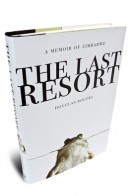 Sarah Larson interviews Douglas Rogers about his new book, which chronicles his parents’ extraordinary life in Zimbabwe. (“It was only in around 2005, when I found out about the brothel, the marijuana crop, the fact that their land had become a safe haven for all these white farmers, that it dawned on me that my parents were in fact the opposite of sad and tragic. I came to see them as heroic. And outrageously funny.”) . . . The PEN American Center is asking for support in bringing attention to the case of Liu Xiaobo, a Chinese critic and intellectual recently indicted for “inciting subversion of state power.” To learn more, go here. And to speak out, go here. . . . Martin Amis believes writers get worse in old age. Clive James disagrees. . . . Blake Butler’s list of the 25 “most important” books of the past decade leans heavily toward experimental and semi-experimental and experiment-influenced fiction, whatever those terms are worth. So, it’s limited, but still interesting. . . . Craig Finn, lead singer of The Hold Steady, talks about adapting Chuck Klosterman’s Fargo Rock City for the screen. . . . Lit Drift is giving away a novel by Pasha Malla. All you have to do to enter the competition for it is leave a comment (there, not here). . . . As so many others look back at the year in books that was, D. G. Myers looks ahead to the year that will be.
Sarah Larson interviews Douglas Rogers about his new book, which chronicles his parents’ extraordinary life in Zimbabwe. (“It was only in around 2005, when I found out about the brothel, the marijuana crop, the fact that their land had become a safe haven for all these white farmers, that it dawned on me that my parents were in fact the opposite of sad and tragic. I came to see them as heroic. And outrageously funny.”) . . . The PEN American Center is asking for support in bringing attention to the case of Liu Xiaobo, a Chinese critic and intellectual recently indicted for “inciting subversion of state power.” To learn more, go here. And to speak out, go here. . . . Martin Amis believes writers get worse in old age. Clive James disagrees. . . . Blake Butler’s list of the 25 “most important” books of the past decade leans heavily toward experimental and semi-experimental and experiment-influenced fiction, whatever those terms are worth. So, it’s limited, but still interesting. . . . Craig Finn, lead singer of The Hold Steady, talks about adapting Chuck Klosterman’s Fargo Rock City for the screen. . . . Lit Drift is giving away a novel by Pasha Malla. All you have to do to enter the competition for it is leave a comment (there, not here). . . . As so many others look back at the year in books that was, D. G. Myers looks ahead to the year that will be.
Tuesday, December 15th, 2009
Programming Note
I’m traveling today, so posting will be light. A new group-written feature is almost ready for the Backlist, and should be up sometime tomorrow…
Tuesday, December 15th, 2009
The Death of a Prince
A friend sent me this obituary, calling it a “nonfiction ode to Calvino.” It recounts the life of Giorgio Carbone, who believed that Seborga, a small town in Italy, “was an ancient principality, cruelly robbed of its sovereignty.”
After convincing his Seborgan neighbors of their true significance, Giorgio Carbone was elected prince in 1963. He gracefully accepted the informal title of His Tremendousness, and was elected prince for life in 1995 by a vote of 304 to 4. Voters then ratified Seborga’s independence, which, by the prince’s interpretation, it already had.
Prince Giorgio established a palace, wrote a Constitution, and set up a cabinet and a parliament. He chose a coat of arms, minted money (with his picture), issued stamps (with his picture) and license plates, selected a national anthem and mobilized a standing army, consisting of Lt. Antonello Lacala. He adopted a motto: Sub umbra sede (Sit in the shade).
Monday, December 14th, 2009
The Cherry & the Pit
A continuing series that highlights books recently acquired by publishing houses for future release. Each post features a book we’re looking forward to, and a book we’re . . . not.
The Cherry:
Cynthia Ozick’s Foreign Bodies, set in postwar New York, Paris, and California, the story of a divorced schoolteacher who tries to resolve her brother’s family dramas, leading to extraordinary and wholly unanticipated results.
The Pit:
Smashing Pumpkins front man Billy Corgan’s untitled spiritual memoir.
Monday, December 14th, 2009
“A Sensitive, Intelligent, Talented Young Actor in a Reversible Coat wouldn’t nearly be enough.”
 Letters of Note is a great, relatively new web site that collects all kinds of correspondence, including office memos. It features plenty of traditional letters, a bunch of them from prominent authors. In 1957, for instance, J. D. Salinger wrote to a Mr. Herbert, who had inquired about the film rights for The Catcher in the Rye. Salinger was set against selling them:
Letters of Note is a great, relatively new web site that collects all kinds of correspondence, including office memos. It features plenty of traditional letters, a bunch of them from prominent authors. In 1957, for instance, J. D. Salinger wrote to a Mr. Herbert, who had inquired about the film rights for The Catcher in the Rye. Salinger was set against selling them:
I keep saying this and nobody seems to agree, but The Catcher in the Rye is a very novelistic novel. There are readymade “scenes”—only a fool would deny that—but, for me, the weight of the book is in the narrator’s voice, the non-stop peculiarities of it, his personal, extremely discriminating attitude to his reader-listener, his asides about gasoline rainbows in street puddles, his philosophy or way of looking at cowhide suitcases and empty toothpaste cartons—in a word, his thoughts.
Not a bad summary of why so many film adaptations don’t do justice to the books. Salinger was also suspicious of actors:
Not to mention, God help us all, the immeasurably risky business of using actors. Have you ever seen a child actress sitting crosslegged on a bed and looking right? I’m sure not. And Holden Caulfield himself, in my undoubtedly super-biassed opinion, is essentially unactable. A Sensitive, Intelligent, Talented Young Actor in a Reversible Coat wouldn’t nearly be enough. [. . .] I’ll stop there. I’m afraid I can only tell you, to end with, that I feel very firm about all this, if you haven’t already guessed. Thank you, though, for your friendly and highly readable letter. My mail from producers has mostly been hell.
Other highlights include: A letter from Kurt Vonnegut to his family from a repatriation camp in 1945; a heartwarming exchange between Dr. Seuss and an aspiring young writer; and a brilliant form letter that Robert Heinlein would send to fans (and critics). You can also read a worthwhile interview with the site’s founder here.
(Via Very Short List)
Monday, December 14th, 2009
Meet Your Index
I spent part of the weekend creating an index for the site. It’s conveniently found by clicking on the word “Index” on the navigation bar at the top of the home page. It contains links to all the books reviewed on the site, alphabetical by author. It will be continually updated.
Friday, December 11th, 2009
The Beat
A weekly roundup of noteworthy reviews from other sources.
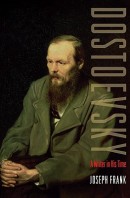 Geordie Williamson reviews the recently published one-volume condensation of Joseph Frank’s massive biography of Dostoevsky. (“Far from burying the writer in detail, Frank’s immense knowledge of 19th-century Russia helps synchronize Dostoevsky with his times.”) . . . Speaking of condensation, Damion Searls has trimmed Thoreau’s two million-word journal to one volume. Geoff Wisner approves of the result. . . . Whether or not it’s “the best stocking stuffer ever for the bibliophile,” as Robert Messenger claims, a new book about architects and their libraries does look beautiful. . . . Of two recent books about basketball, Jason Zengerle writes that one “already feels a little dated” and the other “admirably reaches for timelessness.” He concludes that they each would have benefited from a bit of the other’s approach. . . . Michael Berry says Michael Crichton’s posthumously published novel is “a diverting coda to a remarkable popular writing career.”
Geordie Williamson reviews the recently published one-volume condensation of Joseph Frank’s massive biography of Dostoevsky. (“Far from burying the writer in detail, Frank’s immense knowledge of 19th-century Russia helps synchronize Dostoevsky with his times.”) . . . Speaking of condensation, Damion Searls has trimmed Thoreau’s two million-word journal to one volume. Geoff Wisner approves of the result. . . . Whether or not it’s “the best stocking stuffer ever for the bibliophile,” as Robert Messenger claims, a new book about architects and their libraries does look beautiful. . . . Of two recent books about basketball, Jason Zengerle writes that one “already feels a little dated” and the other “admirably reaches for timelessness.” He concludes that they each would have benefited from a bit of the other’s approach. . . . Michael Berry says Michael Crichton’s posthumously published novel is “a diverting coda to a remarkable popular writing career.”
Thursday, December 10th, 2009
Overdue Makeovers
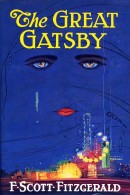 Book design has been all the rage for a while now. I think it’s completely reasonable to trace the trajectory of that rage along with the rise of the design-obsessed McSweeney’s over the past decade. Professionals might disagree. In any case, new design projects have been legion so far this century: There’s Penguin’s graphic-art covers for classics; Penguin’s Great Ideas series; Harper Perennial’s Olive Editions; and the lovely unity of the NYRB Classics. Among many others.
Book design has been all the rage for a while now. I think it’s completely reasonable to trace the trajectory of that rage along with the rise of the design-obsessed McSweeney’s over the past decade. Professionals might disagree. In any case, new design projects have been legion so far this century: There’s Penguin’s graphic-art covers for classics; Penguin’s Great Ideas series; Harper Perennial’s Olive Editions; and the lovely unity of the NYRB Classics. Among many others.
Given all this, I’m wondering why no one has reimagined The Great Gatsby. The cover has thrived since it was created in the mid-1920s by Francis Cugat, who was commissioned to make it for the book. Fitzgerald loved it, and I’m sure many designers do, too. I just think it’s tacky. The deep red and blue, the green tear falling, the nude figures reflected in the eyes. Especially uninviting is the most prominent current edition, which features a white border around the original image.
Does anyone else think this American classic could use a new look? Any other books that are overdue for a makeover?
Wednesday, December 9th, 2009
“No other task is of any consequence.”
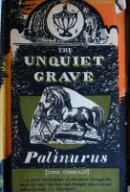 In his list of the best books he read this year, David Shields mentions The Unquiet Grave by Cyril Connolly (writing as “Palinurus”). It’s a gem of a book, and Shields’ listing of it reminded me of its opening paragraphs:
In his list of the best books he read this year, David Shields mentions The Unquiet Grave by Cyril Connolly (writing as “Palinurus”). It’s a gem of a book, and Shields’ listing of it reminded me of its opening paragraphs:
The more books we read, the sooner we perceive that the true function of a writer is to produce a masterpiece and that no other task is of any consequence. Obvious though this should be, how few writers will admit it, or having made the admission, will be prepared to lay aside the piece of iridescent mediocrity on which they have embarked! Writers always hope that their next book is going to be their best, for they will not acknowledge that it is their present way of life which prevents them from ever creating anything different or better.
All excursions into journalism, broadcasting, propaganda and writing for the films, however grandiose, are doomed to disappointment. To put of our best into these forms is another folly, since thereby we condemn good ideas as well as bad to oblivion. It is in the nature of such work not to last, so it should never be undertaken. Writers engrossed in any literary activity which is not their attempt at a masterpiece are their own dupes and, unless these self-flatterers are content to write off such activities as their contribution to the war effort, they might as well be peeling potatoes.
Wednesday, December 9th, 2009
Early Nominee for Best Title of 2010
Former Diff’rent Strokes star and troubled child actor Todd Bridges has a memoir coming out in April. It’s an early contender for best title of 2010. It’s called Killing Willis.
(On a related note, if you haven’t seen the “creepy” opening credits of Diff’rent Strokes with alternate music, you’ve missed one of the funniest things ever.)
Wednesday, December 9th, 2009
Translation’s Rock Stars
At The Millions, Anna Clark interviews translators Richard Pevear and Larissa Volokhonsky, a longer and more satisfying interview with them than recent ones I’ve seen. A taste:
TM: What are the greatest misconceptions about Tolstoy?
RP and LV: The greatest misconception might come from believing what Tolstoy said about his artistic work after his “conversion to true Christianity,” as he called it; that is, from believing what he preached in the series of tracts and polemical works he wrote after 1880. He was never able to practice what he preached. He remained a deeply divided and contradictory man all his life. And that nourished his artistic work. We took a phrase from W. B. Yeats as the epigraph for our introduction to Anna Karenina: “We make out of the quarrel with others, rhetoric, but of the quarrel with ourselves, poetry.” That is even more true of Tolstoy in his later works, because his inner quarrel was more intense.
Tuesday, December 8th, 2009
A Selection
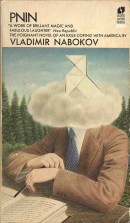 From Pnin
From Pnin by Vladimir Nabokov:
Pnin skipped the actual reports and case histories—and there is no need to go here into those hilarious details. Suffice it to say that already at the third session of the female group, after this or that lady had gone home and seen the light and come back to describe the newly discovered sensation to her still blocked but rapt sisters, a ringing note of revivalism pleasingly colored the proceedings. (“Well, girls, when George last night—”) And this was not all. Dr. Eric Wind hoped to work out a technique that would allow bringing all those husbands and wives together in a joint group. Incidentally it was deadening to hear him and Liza smacking their lips over the word “group.” In a long letter to distressed Pnin, Professor Chateau affirmed that Dr. Wind even called Siamese twins “a group.” And indeed progressive, idealistic Wind dreamed of a happy world consisting of Siamese centuplets, anatomically conjoined communities, whole nations built around a communicating liver. “It is nothing but a kind of microcosmos of communism—all that psychiatry,” rumbled Pnin, in his answer to Chateau. “Why not leave their private sorrows to people? Is sorrow not, one asks, the only thing in the world people really possess?”
Tuesday, December 8th, 2009
In the Ether
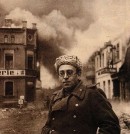 Chris Hedges discusses two approaches to war writing; he “detests” one of them, and thinks the other, represented by Vasily Grossman’s novel Life and Fate
Chris Hedges discusses two approaches to war writing; he “detests” one of them, and thinks the other, represented by Vasily Grossman’s novel Life and Fate, allows for powerful insights that “elude even very talented nonfiction writers.” (Pictured at left: Grossman in Germany, 1945.) . . . A wide range of answers to “What is the best book you know that’s never been translated into English?” And the reason why the question is important. . . . A profile of and interview with 90-year-old literary critic Frank Kermode. (”It’s pure chance,” he says, “that one isn’t either dead or useless; I don’t think either of those things is true, yet, of me.”) . . . A new store in Illinois is selling books by the pound. . . . Scott Pack has begun counting down the ten best books he read this year (doesn’t matter when they were published), and numbers 10 and 9 are two intriguingly quirky short novels: One about a man who marries a superhero and then is made (literally) invisible to her by a jealous ex; and the other about an unwanted visitor who breaks into someone’s house and hosts a party there, written by a former member of The Sugarcubes. . . . One man’s idea of Philip Larkin’s best 94 poems, ranked.
Monday, December 7th, 2009
Neglected Eyesores
 Joe Queenan notices something about the books he hasn’t read:
Joe Queenan notices something about the books he hasn’t read:
I recently scrutinized my library to see how many unread books had disgusting covers. The results were staggering. In one bookcase sat rows and rows of beautiful Penguin classics. Beneath them sat my favorite works of fiction, all of which had very nice packaging . . . And beneath them were a few dozen gorgeous art books.
But in the next room, in the cabinet where I keep my unread books, I was stunned to realize how many of these neglected works were eyesores. Some were bland or ugly because they dated from earlier eras or because they came from England. Particularly ghastly was the 1951 Modern Library hardcover edition of Edward Bellamy’s Looking Backward, which looks like a trash-bagged Malevich drawing; a putrid aquamarine collection of Patrick White stories called The Cockatoos; and an uninspired 1976 Portable Dorothy Parker, adorned with a photo that made Parker look like the least amusing woman that ever lived, with the possible exception of Ayn Rand.
Monday, December 7th, 2009
Slim & Grim Pickings
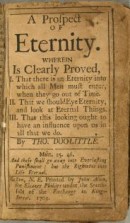 As the repetitive Best of ‘09 lists continue to pile up (OK, OK, I like Lorrie Moore, too), I was hoping someone would do something like this, and Jill Lepore is the perfect person for it. She has listed the Top Ten Books of 1709. The task of whittling them down was far less onerous than it is these days:
As the repetitive Best of ‘09 lists continue to pile up (OK, OK, I like Lorrie Moore, too), I was hoping someone would do something like this, and Jill Lepore is the perfect person for it. She has listed the Top Ten Books of 1709. The task of whittling them down was far less onerous than it is these days:
Something north of a hundred and fifty thousand books were published in 2009. That number daunted me, so I got to thinking of a year, three centuries ago, when, in all of the British mainland colonies, only thirty-one books were printed (if you discount a handful of broadsheets, proclamations, and volumes of laws). The pickings are slim—and grim [ . . . ] All but three books published in 1709 were religious tracts, printed in Boston, and nearly all of them have to do with the day of judgment.
One of the ten books has this catchy title: Solemn Advice to Young Men Not to Walk in the Wayes of Their Heart and in Sight of Their Eyes; but to remember the Day of Judgment. Read the full list here.
Friday, December 4th, 2009
“It mesmerized me, that icy coldness in my youth—but I’ve had my revenge since then.”
 To wrap up Letters Week, I draw your attention to an incredible project: the online, searchable archive of all of Vincent van Gogh’s letters. The complete correspondence was recently published in a deluxe edition with a neat list price of $600. (At six volumes illustrated with 2,000 works of art, it seems fair, especially at the discounted price
To wrap up Letters Week, I draw your attention to an incredible project: the online, searchable archive of all of Vincent van Gogh’s letters. The complete correspondence was recently published in a deluxe edition with a neat list price of $600. (At six volumes illustrated with 2,000 works of art, it seems fair, especially at the discounted price of $480; there’s another complete, less lavish version available for just $63
.) The letter excerpted below, written to his brother Theo on October 2, 1884, came to my attention in Julian Bell’s review of the new set, and Bell explains the context for it: “[Vincent] has been carrying on with a vulnerable young village woman, to the disgust of his parents, and now she’s tried—not quite successfully, thank God—to poison herself. Theo has written from Paris, upbraiding him. Vincent’s rejoinder to his brother—vehement, outrageous and magnificent—ends up with nine postscripts, and this is from the seventh”:
Now there are people who say to me, ‘what were you doing getting involved with her?’—that’s one fact. Now there are people who say to her, ‘what were you doing getting involved with him?’—that’s a second fact. Apart from that, both she and I have sorrow enough and trouble enough—but regret—neither of us. [ . . . ]
Oh—I’m no friend of present-day Christianity, even though the founder was sublime—I’ve seen through present-day Christianity only too well. It mesmerized me, that icy coldness in my youth—but I’ve had my revenge since then. How? By worshipping the love that they—the theologians—call sin, by respecting a whore etc., and not many would-be respectable, religious ladies. [ . . . ]
I tell you, if one wants to be active, one mustn’t be afraid to do something wrong sometimes, not afraid to lapse into some mistakes. To be good—many people think that they’ll achieve it by doing no harm—and that’s a lie, and you said yourself in the past that it was a lie. That leads to stagnation, to mediocrity. Just slap something on it when you see a blank canvas staring at you with a sort of imbecility.
You don’t know how paralyzing it is, that stare from a blank canvas that says to the painter you can’t do anything. The canvas has an idiotic stare, and mesmerizes some painters so that they turn into idiots themselves.
Many painters are afraid of the blank canvas, but the blank canvas is afraid of the truly passionate painter who dares—and who has once broken the spell of ‘you can’t’.
Life itself likewise always turns towards one an infinitely meaningless, discouraging, dispiriting blank side on which there is nothing, any more than on a blank canvas.
But however meaningless and vain, however dead life appears, the man of faith, of energy, of warmth, and who knows something, doesn’t let himself be fobbed off like that. He steps in and does something, and hangs on to that, in short, breaks, ‘violates’—they say.
Let them talk, those cold theologians.
Friday, December 4th, 2009
America Now, Compressed
 Over at the Huffington Post, Second Pass contributor Alexander Nazaryan makes the case for the novel he thinks best represents the first decade of the century:
Over at the Huffington Post, Second Pass contributor Alexander Nazaryan makes the case for the novel he thinks best represents the first decade of the century:
No novel better captures the background dread of everyday life these days—terrorism jitters, credit-default swaps, mutant flu strains—than Joseph O’Neill’s Netherland. Like The Great Gatsby—to which it bears obvious resemblance—Netherland compresses the American experience into a critical mass, and then proceeds to pick it apart. . . . Netherland has been called a post 9-11 novel, but that isn’t quite true: it is a post-American novel, announcing the conclusion of what Time founder Henry Luce called in 1941 the American Century.
Friday, December 4th, 2009
The Beat
A weekly roundup of noteworthy reviews from other sources.
 Leonard Cassuto says that “In Joan Schenkar, [Patricia] Highsmith has found a biographer who does meaningful justice to both her powerful work and her uncomfortable existence.” . . . Mark Mazower’s new book, No Enchanted Palace, examines the “ideological origins of the UN.” . . . Barbara Ehrenreich’s latest explores the ideological origins (and pernicious effects) of “the mass delusion that is positive thinking.” . . . John G. Rodwan, Jr., is not impressed by Michael Chabon’s thoughts about fatherhood. (“He acknowledges that he offers ‘depressingly trite’ statements and ‘tiresome, empty’ observations. He fails to take the next step of refraining from making them.”) . . . George Scialabba reviews a new history of Communism by “a splendid storyteller with a fascinating tale to tell.”
Leonard Cassuto says that “In Joan Schenkar, [Patricia] Highsmith has found a biographer who does meaningful justice to both her powerful work and her uncomfortable existence.” . . . Mark Mazower’s new book, No Enchanted Palace, examines the “ideological origins of the UN.” . . . Barbara Ehrenreich’s latest explores the ideological origins (and pernicious effects) of “the mass delusion that is positive thinking.” . . . John G. Rodwan, Jr., is not impressed by Michael Chabon’s thoughts about fatherhood. (“He acknowledges that he offers ‘depressingly trite’ statements and ‘tiresome, empty’ observations. He fails to take the next step of refraining from making them.”) . . . George Scialabba reviews a new history of Communism by “a splendid storyteller with a fascinating tale to tell.”
Friday, December 4th, 2009
“Nothing I hated worse than the company of other children…”
 To accompany this week’s review of Thomas Mallon’s book about letters, each day the blog will feature two letters. Flannery O’Connor wrote the one below to Betty Hester on March 10, 1956. (The excerpt below picks up about a third of the way through the letter.) It’s taken from The Habit of Being
To accompany this week’s review of Thomas Mallon’s book about letters, each day the blog will feature two letters. Flannery O’Connor wrote the one below to Betty Hester on March 10, 1956. (The excerpt below picks up about a third of the way through the letter.) It’s taken from The Habit of Being edited by Sally Fitzgerald. In the book, Hester, O’Connor’s closest friend and the recipient of many of her letters, was given the pseudonym “A.”
I think of novenas the same way I think of the hideous Catholic churches you all too frequently find yourself in, that is, after a time I cease to see them even though I’m in them. The virtue of novenas is that they keep you at it for nine consecutive days and the human attention being what it is, this is a long time. I hate to say most of these prayers written by saints-in-an-emotional-state. You feel you are wearing somebody else’s finery and I can never describe my heart as “burning” to the Lord (who knows better) without snickering.
I have just been disgusted to read the review of Caroline Gordon’s book in Time. They could not be expected to like such a book but what seems particularly low in the review is that it implies there is not even any honest of intention in the writing. I read the book in page proofs. I don’t think it is entirely successful as she is trying to do something impossible, but I think it is a good deal better than most of what they will recommend during the year. I am a Time subscriber but I think it is a stupid magazine . . . This is the lady who taught me so much about writing . . .
It is hard to make your adversaries real people unless you recognize yourself in them — in which case, if you don’t watch out, they cease to be adversaries. I don’t know if that was Dostoevsky’s trouble or not. As for me you are mighty right I could do with some learning about souls not my own — only I wouldn’t be knowing where I’m to get that from.
This pride in the tin leg* comes from an old scar. I was, in my early days, forced to take dancing to throw me into the company of other children and to make me graceful. Nothing I hated worse than the company of other children and I vowed I’d see them all in hell before I would make the first graceful move. The lessons went on for a number of years but I won. In a certain sense.
The enclosed (“Greenleaf”) is for you. I sent it to Mr. Ransom last week and got word today that they will use it probably in the summer issue. If you don’t like it, don’t fail to say so. I have a heart of pure steel.
*In a previous letter Flannery noted her astonishment that William Sessions had once danced professionally in the ballet. She said that she herself had a “tin leg.” This echoes an entry in her youthful journal: “Do not see why children twelve years old have to take dancein.”
Thursday, December 3rd, 2009
“It was not gin but rum (unopened) and the steps were slick…”
 To accompany this week’s review of Thomas Mallon’s book about letters, each day the blog will feature two letters. If there is a Mount Olympus of letter-writers, Flannery O’Connor stands at or near the top of it. So this is the first of two letters of hers that I’ll share, the second appearing tomorrow morning. O’Connor wrote the letter below to Robert Lowell on December 25, 1958. It’s taken from The Habit of Being
To accompany this week’s review of Thomas Mallon’s book about letters, each day the blog will feature two letters. If there is a Mount Olympus of letter-writers, Flannery O’Connor stands at or near the top of it. So this is the first of two letters of hers that I’ll share, the second appearing tomorrow morning. O’Connor wrote the letter below to Robert Lowell on December 25, 1958. It’s taken from The Habit of Being edited by Sally Fitzgerald, a must-have for anyone’s library.
It is mighty unseemly of you to enshrine me in your memory falling up the steps with a bottle of gin. I recollect the incident. It was not gin but rum (unopened) and the steps were slick . . . In our house the liquor is kept in the bathroom closet between the Draino and the plunger, and you don’t get any unless you are about dead. The last time I had any was when I dropped the side of the chicken brooder on my foot and broke my toe.
This spring we spent four days with the Fitzgeralds in Levanto and then Sally went with us to Paris and Lourdes and then to Rome. Europe didn’t affect me none, but since coming back my bone has begun to recalcify, an improvement that was not expected.
I would like to think I will finish my book this year but this may be just what I would like to think. I will hope to read yours.
My love to you and Elizabeth and Harriet. That Harriet is going to take over if you don’t watch out. You ought to raise her in the South and then she wouldn’t have to go to school. I am really looking forward to the next generation being uneducated.
Thursday, December 3rd, 2009
Palin Write-a-Likes
 Slate has created a slide show featuring the best entries for its “write like Sarah Palin” contest. Runners-up include this one, by Kaylyn Munro, which certainly sounds like the way Palin speaks:
Slate has created a slide show featuring the best entries for its “write like Sarah Palin” contest. Runners-up include this one, by Kaylyn Munro, which certainly sounds like the way Palin speaks:
The minute I was on that stage in Florida with all those lights in my eyes and the smell of Alaska still on my fingertips and my family, too, all around out there, I was where I dreamed of all those years on the basketball court and in Alaskas’s God given beauty which we must cherish and use as God gave it us to use and in honor of the troops, also.
The second-place entry came from Steve Aydt:
Here’s a little news flash for your Department of Media: Superman’s parents chose life and he was adopted in small-town USA by real Americans who run our factories, harvest our meat-bearing animals, and wave Old Glory down at the courthouse and the churches, not in Washington D.C. by cynical power-brokers and liberal scientists.
Read all twelve finalists, including the winner, at Slate.
Thursday, December 3rd, 2009
“I come of a savage & contradictious race…”
 To accompany this week’s review of Thomas Mallon’s book about letters, each day the blog will feature two letters. This one was written by Sylvia Townsend Warner to William Maxwell on January 11, 1968. It’s taken from The Element of Lavishness
To accompany this week’s review of Thomas Mallon’s book about letters, each day the blog will feature two letters. This one was written by Sylvia Townsend Warner to William Maxwell on January 11, 1968. It’s taken from The Element of Lavishness edited by Michael Steinman. Thanks to Lisa Peet at Like Fire for passing it along.
I am very glad you were not burnt up in your car. I really am. I should be poorly off without you and as well as that I love you without the spur of self-interested motives. But some of the story is just as I would expect. Have you noticed that it is always harmless people like you & me, people who can’t bear to inconvenience others or disturb or disquiet them who burst into flames in the midst of gas tanks and so forth?
Yes, it is very sad for us both that Mr. Shawn doesn’t like the Edom stories. He comes of a sombre race. For myself, I come of a savage & contradictious race and my only reaction to his statement that my other stories “are wonderful” was to resolve that I will never write another. But I doubt if I can substantiate this noble resolution since I am in the middle of one at this moment. It is very short and black as pitch and he will reject it.
But don’t be distressed that you have had any part in encouraging me to write about the A. A. Galleries. All you have done has been to incite me to enjoying myself—the act of a friend.
Thursday, December 3rd, 2009
Distress and Elegance
 Pertinent to the week’s doings around here, Michael Wood reviews a new volume of T. S. Eliot’s letters:
Pertinent to the week’s doings around here, Michael Wood reviews a new volume of T. S. Eliot’s letters:
Eliot’s description of himself as “within measurable distance of the end of my tether” combines distress with elegance. Writing to Herbert Read he says: “I have been of late exceptionally busy and exceptionally worried, even for me.” And writing again to his brother he says his life is such a mess that it would make him laugh, “if any Eliot could ever laugh.” He likes this one so much he repeats it to Harold Monro a day later with a minor variation: “if any Eliot ever could laugh.”
But there is a sort of morality to all this that shifts it beyond complaint, kink and joke, and helps us to understand the poetry and the criticism. Eliot not only thought life was hard, he thought it ought to be hard, and with this verdict he joined all those other modern writers and thinkers who adopted or at least were tempted by what J. P. Stern in another context calls the “dear purchase,” the notion that sacrifice is worth nothing if it doesn’t cost too much.
Wednesday, December 2nd, 2009
“C acts under the greatest pressure, in a fearful sweat…”
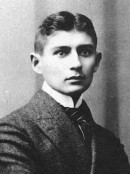 To accompany this week’s review of Thomas Mallon’s book about letters, each day the blog will feature two letters. This one was written by Franz Kafka to Milena Jesenská in November 1920. It’s taken from Letters to Milena
To accompany this week’s review of Thomas Mallon’s book about letters, each day the blog will feature two letters. This one was written by Franz Kafka to Milena Jesenská in November 1920. It’s taken from Letters to Milena translated by Philip Boehm.
You say, Milena, you don’t understand it. Try to understand it by calling it a disease. It’s one of the many manifestations of disease which psychoanalysis claims to have discovered. I do not call it a disease and consider the therapeutic part of psychoanalysis is a helpless mistake. All these alleged diseases, sad as they may seem, are matters of faith, anchorages in some maternal ground for souls in distress. Consequently, psychoanalysis also maintains that religions have the same origin as “diseases” of the individual. Of course, today most of us don’t feel any sense of religious community; the sects are countless and limited to individuals, but perhaps it only seems that way from our present perspective.
On the other hand, those anchorages which are firmly fixed in real ground aren’t merely isolated, interchangeable possessions—they are performed in man’s being, and they continue to form and re-form his being (as well as his body) along the same lines. And this they hope to heal?
In my case one can imagine 3 circles: an innermost circle A, then B, then C. The center A explains to B why this man is bound to torment and mistrust himself, why he has to give up (it isn’t giving up, that would be very difficult—it’s merely a having-to-give-up), why he may not live. [. . .] Nothing more is explained to C, the active human being; he simply takes orders from B. C acts under the greatest pressure, in a fearful sweat (is there any other sweat that breaks out on the forehead, cheeks, temples, scalp—in short, around the entire skull? That’s what happens with C). Thus C acts more out of fear than understanding; he trusts, he believes that A has explained everything to B and that B has understood everything and passed it on correctly.
Wednesday, December 2nd, 2009
Art Direction at the Monkey House
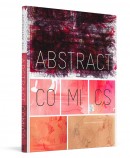 The Casual Optimist catches up with Jacob Covey, Art Director for Fantagraphics, the comics and art publisher that consistently turns out beautiful work:
The Casual Optimist catches up with Jacob Covey, Art Director for Fantagraphics, the comics and art publisher that consistently turns out beautiful work:
If the publishing industry is a zoo, then Fantagraphics is the monkey house. It’s not a conventional workplace and you could get tetanus from walking barefoot but it’s a place where everyone is laboring out of love and there’s a lot of receptivity to trying new things and having your ideas heard. Much more so than I think is possible at most publishers. I have immense respect for the history of the company as an archivist of great work and I have the opportunity to deal with our publishing decisions on a regular basis. It’s satisfying in that way — but the office itself is a neglected three story house with 30 years of dusty artwork, ancient paste-ups, and discarded razor blades strewn about. So it’s not for everyone.
Wednesday, December 2nd, 2009
“He is a second son.”
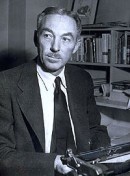 To accompany this week’s review of Thomas Mallon’s book about letters, each day the blog will feature two letters. This one was written by E. B. White to Ursula Nordstrom, his editor at Harper & Row, on November 14, 1945. It’s taken from the thoroughly enjoyable Letters of E. B. White
To accompany this week’s review of Thomas Mallon’s book about letters, each day the blog will feature two letters. This one was written by E. B. White to Ursula Nordstrom, his editor at Harper & Row, on November 14, 1945. It’s taken from the thoroughly enjoyable Letters of E. B. White revised and updated by Martha White. (Speaking of Nordstrom, Dear Genius: The Letters of Ursula Nordstrom
is also a terrific book.)
Dear Miss Nordstrom:
On or two of the Harper ads referred to Stuart as a “mouse.” This is inaccurate and probably better be abandoned. Nowhere in the book (I think I am right about this) is Stuart described as a mouse. He is a small guy who looks very much like a mouse, but he obviously is not a mouse. He is a second son.
There are a great many words that your advertising department can summon for this strange emergency: being, creature, party, customer, fellow, person.
(I am wrong, Stuart is called a mouse on Page 36—I just found it. He should not have been.)
Anyway, you see what I mean.
Yrs,
E. B. White
Wednesday, December 2nd, 2009
Nabokov Tours His Own Shelf
Tuesday, December 1st, 2009
“Ye gods—I wish I were a millionaire—”
 To accompany this week’s review of Thomas Mallon’s book about letters, each day the blog will feature two letters. This one was written by Elizabeth Bishop to Robert Lowell on May 29, 1973. She sent it from Seattle. It’s taken from Words in Air: The Complete Correspondence Between Elizabeth Bishop and Robert Lowell
To accompany this week’s review of Thomas Mallon’s book about letters, each day the blog will feature two letters. This one was written by Elizabeth Bishop to Robert Lowell on May 29, 1973. She sent it from Seattle. It’s taken from Words in Air: The Complete Correspondence Between Elizabeth Bishop and Robert Lowell edited by Thomas Travisano with Saskia Hamilton. The book notes that the “little book” she mentions is “[p]ossibly a letter-press printing of ‘Poem’ for the Phoenix Book Shop, New York (1973).”
Dear Cal:
I’ll be going back to Cambridge in 3 or 4 days and I’ll write you from there—I don’t like this kind of little book very much, but I finally gave in & did this one—or they did—& you might as well have a copy, since I believe you like the poem—
I am not feeling TOO friendly at the moment, because my “class” is finding you very difficult & much too EASTERN!—&, save me, they won’t look up words, even the easiest, in the dictionary . . . Ye gods—I wish I were a millionaire—but anyway, never again—
Much love,
Elizabeth

